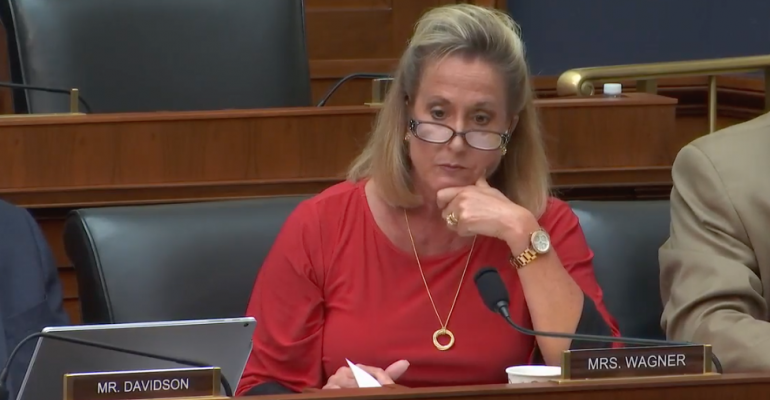During a House Financial Services Committee hearing on Wednesday, U.S. Reps. Ann Wagner (R-Mo.) and Warren Davidson (R-Ohio) said they had major concerns over the Securities and Exchange Commission’s use of in-house judges to litigate certain cases, arguing that the judges’ near 100 percent success rate raises red flags about conflicts of interest.
Wagner ripped into Stephanie Avakian, co-director of enforcement at the SEC, expressing concern that these judges are not appointed under Article III of the Constitution, which grants judicial power. She also pointed to a 2015 Wall Street Journal article, which reported that the agency wins 90 percent of the time in its own administrative proceedings.
“These are complicated issues, and I have great concerns of this overreach of authority, especially given the fact that these are not Article III judges,” Wagner said. “I look forward to working with you and the agency as we go forward to get the most proper outcome concerning these issues.”
“Since we’ve been in this job, which has now been just about a year, the circumstances in which we’ve filed litigation actions as administrative proceedings have been fairly limited,” Avakian said. “And I would say broadly they’ve been limited to circumstances where either the charges that we’re pursuing are only available in the administrative forum, so think ‘failure to supervise of a broker/dealer’—something like that. Or where the principal relief we’re seeking is only available in the administrative forum, so barring someone from being in the securities business or where the person involved is a registered person, like a registered broker/dealer or an investment advisor.”
But Wagner pressed Avakian on the undue bias in favor of the commission.
“Probably worth noting that in the last year we fared much better in litigation in district court than we did in our administrative forum; I think our success rate was less than 60 percent,” Avakian responded.
“The appellate rights are initially to the commission, but after that to the U.S. Circuit Court of Appeals, which is the same appellate path that a case takes if it goes through the district court,” she added. “If there’s concern, ultimately there is a path for appeal that’s very similar to that.”
The defendant in these cases does not have a choice about which path to take, one of the reasons Davidson last year introduced the Due Process Restoration Act of 2017, which would allow defendants in SEC enforcement cases the option to fight in a federal district court rather than the SEC’s administrative forum.
Davidson also expressed concerns over the in-house judges’ batting average.
“Don’t get me wrong; when we bring a case, we’re looking to win them all,” said Steven Peikin, co-director of SEC enforcement. “We don’t. We win about 75 percent of our cases in federal court and about 85 percent in administrative forums. They’re roughly equivalent success rates.”
Peikin added that the rules around administrative proceedings have been modernized in recent years, for example, to allow for depositions on each side. And there are certain protections in the administrative forum that aren’t available in federal court, such as having to turn over your entire file immediately.
The U.S. Supreme Court is currently hearing a case challenging the SEC’s use of in-house judges. The case is being brought by investment advisor Raymond Lucia, a San Diego, Calif.-based radio personality who had been barred from the industry for life by an SEC judge for misleading investors about his “Buckets of Money” strategy.





